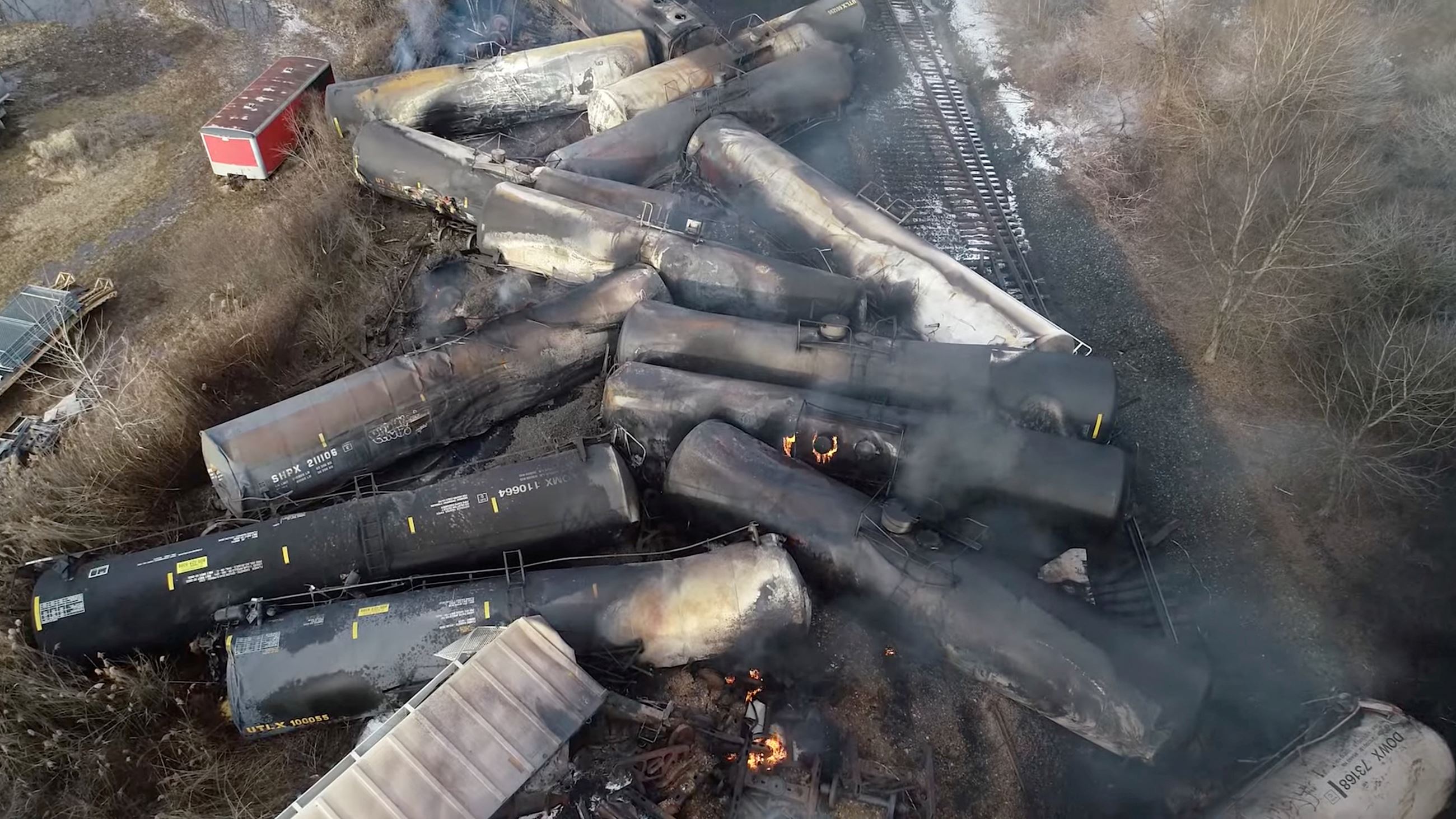East Palestine's Toxic Legacy: The Persistence Of Chemicals After The Train Derailment

Table of Contents
The Initial Chemical Release and Immediate Impacts
The February 3, 2023, derailment unleashed a torrent of hazardous materials, dramatically altering the landscape and the lives of those living nearby.
Types of Chemicals Released
The train carried a variety of hazardous chemicals, most notably vinyl chloride, a known carcinogen used in the production of PVC plastics. Butyl acrylate, another toxic chemical used in paints and adhesives, was also released. These volatile organic compounds (VOCs) posed immediate dangers through inhalation and skin contact. Other chemicals present added to the complexity of the environmental contamination.
- Immediate Consequences: The derailment resulted in immediate evacuations of thousands of residents, a controlled burn of vinyl chloride to prevent a potential explosion (which released toxic phosgene gas), and widespread air and water contamination.
- Short-Term Health Effects: Residents reported a range of immediate health problems, including headaches, nausea, respiratory irritation, and skin rashes. The precise short-term health impact is still being assessed.
- Initial Cleanup Efforts: Initial cleanup efforts focused on containing the immediate spill and preventing further spread. However, the scope of the contamination quickly revealed limitations in the initial response.
Long-Term Environmental Contamination
The environmental consequences of the East Palestine derailment extend far beyond the immediate aftermath. The released chemicals have infiltrated the soil and water, posing a long-term threat.
Soil and Water Contamination
Significant soil and water contamination has been documented, with vinyl chloride and other toxins leaching into the ground and waterways. This poses risks to both wildlife and human health.
- Persistence and Bioaccumulation: Many of the released chemicals are persistent organic pollutants (POPs), meaning they break down slowly in the environment and can bioaccumulate in the food chain.
- Testing and Assessment: Testing efforts are underway to assess the full extent of the contamination, but ongoing monitoring is crucial to understand the long-term impacts.
- Water and Agricultural Concerns: Contamination of drinking water sources and agricultural land raises serious concerns about long-term food safety and public health. The potential for groundwater contamination remains a significant worry.
Long-Term Health Effects on Residents
The long-term health consequences for East Palestine residents remain a primary concern. Exposure to the released chemicals could have lasting implications.
Potential Health Risks
Exposure to vinyl chloride and other toxins carries a heightened risk of various health problems.
- Potential Health Problems: Long-term health risks include various cancers, respiratory illnesses (such as asthma and chronic obstructive pulmonary disease), neurological disorders, and reproductive issues.
- Causality Challenges: Establishing a direct causal link between chemical exposure and specific health problems can be challenging, requiring extensive epidemiological studies.
- Ongoing Monitoring and Support: Long-term health monitoring of residents is essential, along with comprehensive medical support for those experiencing health problems.
Legal and Political Ramifications
The East Palestine derailment has ignited significant legal and political fallout, raising questions of corporate responsibility and government oversight.
Accountability and Legal Action
Numerous lawsuits have been filed against Norfolk Southern, the railway company operating the train, and other potentially responsible parties.
- Corporate Responsibility: The incident has intensified the debate over corporate accountability for environmental damage and the adequacy of existing regulations.
- Government Response: The government's response, including the speed and effectiveness of the cleanup and support for affected residents, has been heavily scrutinized.
- Political Implications: The disaster has fueled broader discussions about transportation safety regulations, hazardous materials handling, and environmental protection policies.
The Path Forward: Remediation and Prevention
Addressing East Palestine's toxic legacy requires a comprehensive approach to remediation and prevention.
Cleanup and Remediation Efforts
Ongoing cleanup and remediation efforts are crucial, but their effectiveness must be rigorously monitored.
- Long-Term Monitoring: Long-term environmental monitoring is essential to track the effectiveness of remediation strategies and assess the ongoing risks.
- Preventing Future Derailments: Improving transportation safety regulations, investing in better track maintenance, and implementing advanced safety technologies are crucial to prevent future derailments.
- Hazardous Materials Handling: Strengthening regulations surrounding the transportation and handling of hazardous materials is paramount.
Conclusion:
East Palestine's toxic legacy serves as a stark reminder of the devastating consequences of industrial accidents and the critical need for robust safety regulations and environmental protection. The long-term health and environmental risks associated with the chemical spill demand sustained attention, comprehensive remediation efforts, and improved oversight. Understanding East Palestine's toxic legacy is crucial to mitigating the impact of future similar incidents and preventing future East Palestine-like tragedies. We must demand accountability from responsible parties and advocate for stricter regulations to protect our communities and environment. Let us work together to ensure that East Palestine's experience serves as a catalyst for meaningful change, preventing a repetition of this devastating event.

Featured Posts
-
 Valentina Shevchenko Considers Zhang Weili Superfight
May 12, 2025
Valentina Shevchenko Considers Zhang Weili Superfight
May 12, 2025 -
 Shevchenko Fiorot Ufc 315 A Closer Look At The May Showdown
May 12, 2025
Shevchenko Fiorot Ufc 315 A Closer Look At The May Showdown
May 12, 2025 -
 Z Dnem Narodzhennya Prints Endryu Ditinstvo Na Fotografiyakh
May 12, 2025
Z Dnem Narodzhennya Prints Endryu Ditinstvo Na Fotografiyakh
May 12, 2025 -
 Stoke On Trent And North Staffordshire Obituaries This Weeks Notices
May 12, 2025
Stoke On Trent And North Staffordshire Obituaries This Weeks Notices
May 12, 2025 -
 Adam Sandlers Massive Net Worth A Look At His Comedy Empire
May 12, 2025
Adam Sandlers Massive Net Worth A Look At His Comedy Empire
May 12, 2025
Latest Posts
-
 25 Years At Allianz Arena Thomas Muellers Emotional Send Off
May 12, 2025
25 Years At Allianz Arena Thomas Muellers Emotional Send Off
May 12, 2025 -
 Alex Winters Early Career The Unknown Mtv Shows Before Freaked
May 12, 2025
Alex Winters Early Career The Unknown Mtv Shows Before Freaked
May 12, 2025 -
 Thomas Muellers Allianz Arena Farewell 25 Years Of Emotion
May 12, 2025
Thomas Muellers Allianz Arena Farewell 25 Years Of Emotion
May 12, 2025 -
 Untapped Talent Alex Winters Early Sketch Comedy On Mtv
May 12, 2025
Untapped Talent Alex Winters Early Sketch Comedy On Mtv
May 12, 2025 -
 Before Freaked Exploring Alex Winters Obscure Mtv Comedy
May 12, 2025
Before Freaked Exploring Alex Winters Obscure Mtv Comedy
May 12, 2025
